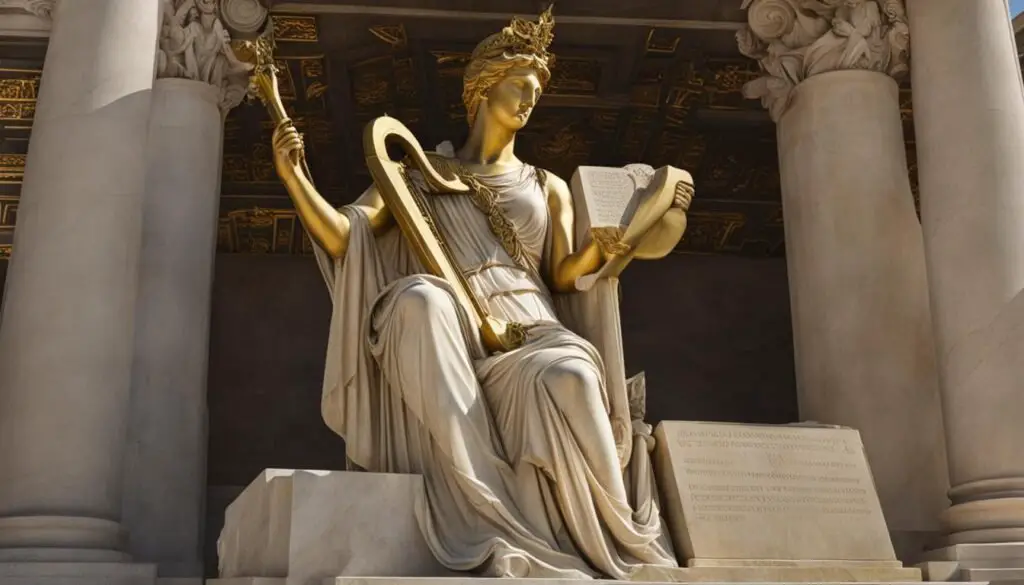Welcome to our exploration of the fascinating world of Greek mythology and its relationship to the Bible. Have you ever wondered if Greek mythology predates the Bible? Join us as we delve into the origins of these ancient belief systems and unravel the connections between them. From the ancient gods and goddesses to the captivating stories that have shaped our cultural heritage, we will uncover the secrets of Greek mythology and its enduring influence.
Key Takeaways:
- Greek mythology originated in ancient Greece around the 12th century BCE.
- It had a profound impact on various aspects of ancient Greek society.
- Key figures and stories in Greek mythology include Zeus, Hera, Persephone, and the Trojan War.
- It influenced religious practices, art, literature, and moral guidance in ancient Greece.
- Judaism, on the other hand, was founded around 2000 BCE by Abraham.
Join us on this journey of discovery as we explore the rich tapestry of ancient beliefs and uncover the intriguing connections between Greek mythology and the Bible. Let’s unravel history together!
When Did Greek Mythology Originate?
In order to understand the origins of Greek mythology, we need to dive into the ancient history of Greece. Greek mythology can be traced back to around the 12th century BCE, during the time of ancient Greece. It is during this period that the stories and beliefs of Greek mythology began to take shape and become a distinct body of knowledge.
Greek mythology was heavily influenced by earlier mythologies and oral traditions that were prevalent in the region. These earlier mythologies served as a foundation upon which Greek mythology was built. As the ancient Greeks developed their own unique culture and civilization, they began to incorporate these myths and legends into their society.
The emergence of major deities, such as Zeus and Hera, can be attributed to this period in Greek history. These powerful gods and goddesses played significant roles in the myths and stories of Greek mythology, and their influence can still be felt today. The tales of Greek mythology provided the ancient Greeks with a rich tapestry of moral guidance and explanations for natural phenomena.
Key Points:
- Greek mythology originated in ancient Greece around the 12th century BCE.
- It was influenced by earlier mythologies and oral traditions of the region.
- The major deities of Greek mythology emerged during this period.
- Greek mythology provided moral guidance and explanations for natural phenomena.
Key Figures and Stories in Greek Mythology

In Greek mythology, the gods and goddesses held immense power and played a crucial role in the lives of the ancient Greeks. These divinities were the central figures of many captivating stories, which served as both entertainment and moral guidance for the people. Let’s explore some of the key figures and stories that make Greek mythology so fascinating.
Greek Gods and Goddesses
The Greek pantheon consisted of a multitude of gods and goddesses, each with their own unique powers and domains. Zeus, the king of the gods, ruled over the heavens and thunder. Hera, his wife and sister, was the queen of the gods and the goddess of marriage and childbirth. Other notable deities include Poseidon, the god of the sea, Aphrodite, the goddess of love and beauty, and Athena, the goddess of wisdom and warfare.
Persephone: Queen of the Underworld
One of the most intriguing figures in Greek mythology is Persephone, the daughter of Zeus and Demeter. Persephone was abducted by Hades, the god of the underworld, and became his queen. This myth explains the changing of the seasons, as Persephone’s time in the underworld corresponds to winter while her return to the surface brings spring and growth.
The Trojan War
The Trojan War is a legendary conflict that was fought between the Greeks and the city of Troy. It was sparked by the abduction of Helen, the wife of Menelaus, by Paris, a prince of Troy. The war lasted for ten years and involved famous heroes such as Achilles, Odysseus, and Hector. The mythological tales surrounding the Trojan War have inspired countless works of literature, including Homer’s epic poem, the Iliad.
These are just a few examples of the rich and diverse characters and stories that populate Greek mythology. From the mighty gods and goddesses to the heroic mortals, each figure contributes to the intricate tapestry of Greek folklore. The tales of Greek mythology continue to captivate and inspire us, showcasing the enduring power of these ancient stories.
Influence of Greek Mythology on Ancient Greek Society
Greek mythology had a profound impact on ancient Greek society, permeating various aspects of everyday life and shaping the cultural landscape of the time. From religious practices to artistic expressions and moral guidance, the influence of Greek mythology was pervasive and enduring.
Religious Practices
In ancient Greece, religious practices revolved around the worship of gods and goddesses who were central figures in Greek mythology. Temples were built in their honor, and rituals and sacrifices were performed to appease them. These religious practices played a crucial role in the lives of the ancient Greeks, offering a sense of connection to the divine and a source of spiritual guidance.
Art and Literature
Greek mythology provided abundant inspiration for artistic expressions in ancient Greece. Sculptures, paintings, and other visual arts depicted mythological figures and narratives, capturing the imagination of the people. Epic poems like Homer’s “Iliad” and “Odyssey” were also steeped in mythical themes and characters. The arts served as a medium through which the stories and values of Greek mythology were conveyed and celebrated.
Moral Guidance
One of the fundamental purposes of Greek mythology was to provide moral guidance and convey ethical principles to the ancient Greeks. Myths often featured moral lessons and explanations for natural phenomena, helping individuals understand their place in the world and guiding them in their actions and choices. These stories offered insights into concepts such as justice, courage, and wisdom, shaping the moral fabric of ancient Greek society.
The influence of Greek mythology on ancient Greek society cannot be overstated. It permeated religious practices, inspired artistic expressions, and provided moral guidance to the people. The enduring legacy of Greek mythology continues to captivate and inspire us today, as we explore the rich tapestry of ancient Greek culture.
Origins of Judaism

Understanding the history of Judaism is essential to unraveling its origins and significance. Judaism, one of the world’s oldest religions, is believed to have been founded around 2000 BCE by Abraham, a prominent figure in Jewish tradition. According to Jewish texts, Abraham entered into a covenant with God, establishing a special relationship between the Israelites and their deity. This covenant laid the groundwork for the monotheistic beliefs that define Judaism.
Key figures in Judaism, such as Moses, King David, and the prophets, played instrumental roles in shaping the religion’s early history. Moses, revered as a prophet and lawgiver, is central to the story of the Israelites’ liberation from slavery in Egypt and the receiving of the Ten Commandments. King David, known for his leadership and establishment of Jerusalem as the capital of Israel, is regarded as a model of righteousness and devotion. The prophets, including Isaiah and Jeremiah, delivered messages from God and guided the Israelites during times of challenge and transformation.
Throughout its history, Judaism has evolved and adapted, embracing various cultural influences and interpretations. Religious practices, moral values, and cultural traditions have been shaped by Jewish beliefs, which continue to form the foundation of Jewish identity and community. Exploring the origins of Judaism enables us to appreciate the rich heritage and enduring significance of this ancient faith.
Key Points:
- Judaism was founded around 2000 BCE by Abraham, who entered into a covenant with God.
- Moses, King David, and the prophets played crucial roles in shaping Jewish history and beliefs.
- Judaism has evolved over time, embracing cultural influences while maintaining its core principles.
- Religious practices, moral values, and cultural traditions are shaped by Jewish beliefs.
Greek Mythology and Jewish Beliefs: A Comparison

When exploring the similarities between Greek mythology and Jewish beliefs, we find intriguing connections that shed light on ancient mythologies and religious traditions. Although there are parallels in certain themes and narratives, such as creation stories, divine intervention, and moral lessons, it is important to note that there is no evidence of direct influence or borrowing between the two.
In Greek mythology, we often encounter biblical references that resemble stories found in Jewish religious texts. For example, the story of the Great Flood in Greek mythology mirrors the account of Noah’s Ark in the Bible. These resemblances can be attributed to the shared cultural exchanges and conflicts between the ancient Greeks and Israelites, rather than indicating a direct influence.
Key Similarities and Interactions
- Creation Stories: Both Greek mythology and Jewish beliefs have narratives explaining the origins of the world and humanity.
- Divine Intervention: Gods and goddesses in Greek mythology, as well as the God of Israel in Jewish beliefs, intervene in human affairs.
- Moral Lessons: Both traditions convey ethical principles through their stories, offering guidance for human behavior.
- Interactions between Greeks and Israelites: The ancient Greeks and Israelites had historical interactions, including trade and conflicts, which could have influenced their respective mythologies and religious beliefs.
However, while Greek mythology continued to evolve and influence Western culture, Jewish beliefs developed into the monotheistic religion known as Judaism. It is important to recognize that Greek mythology and Jewish religious texts serve distinct purposes and hold unique significance within their respective cultures.
Conclusion
In conclusion, both Greek mythology and Judaism have had a profound impact on Western culture. Greek mythology continues to be a source of inspiration for art, literature, and popular culture. From movies like “Clash of the Titans” to books like “Percy Jackson and the Olympians,” the stories and characters of Greek mythology have captivated audiences for centuries.
Judaism, on the other hand, has influenced religious traditions and moral values. The core principles of monotheism, ethical behavior, and the importance of community that originated in Judaism have had a lasting impact on Western society.
Over time, both Greek mythology and Judaism have evolved. Modern interpretations of these ancient traditions have shaped our understanding and kept them relevant in today’s world. Scholars, writers, and artists continue to explore and reinterpret the stories and teachings of Greek mythology and Judaism, ensuring that their legacies endure.
While Greek mythology predates the Bible in terms of historical origins, the question of influence is more complex. While there are similarities between the two belief systems, there is no substantial evidence of direct borrowing or impact. Instead, they developed independently, each contributing its own unique perspective to Western culture.
FAQ
Does Greek mythology predate the Bible?
Greek mythology originated in ancient Greece around the 12th century BCE, while the Bible dates back to various time periods. Greek mythology and the Bible have different origins and cultural contexts.
When did Greek mythology originate?
Greek mythology took shape and became a distinct body of stories and beliefs around the 12th century BCE in ancient Greece.
Who are some key figures and stories in Greek mythology?
Greek mythology is filled with fascinating characters such as Zeus, Hera, Persephone, and Achilles. The Trojan War is one of the most famous events in Greek mythology.
How did Greek mythology influence ancient Greek society?
Greek mythology had a profound impact on various aspects of ancient Greek society, including religious practices, art and literature, and moral guidance.
When did Judaism originate?
Judaism is believed to have been founded around 2000 BCE by Abraham. The covenant with Abraham laid the groundwork for monotheism in Judaism.
Are there any similarities between Greek mythology and Jewish beliefs?
There are similarities between Greek mythology and Jewish religious texts, such as creation stories, divine intervention, and moral lessons. However, there is no evidence of direct influence or borrowing.
What is the impact of Greek mythology and Judaism on Western culture?
Greek mythology continues to inspire art, literature, and popular culture, while Judaism has influenced religious traditions and moral values. Both belief systems have left a lasting impact on Western culture.




